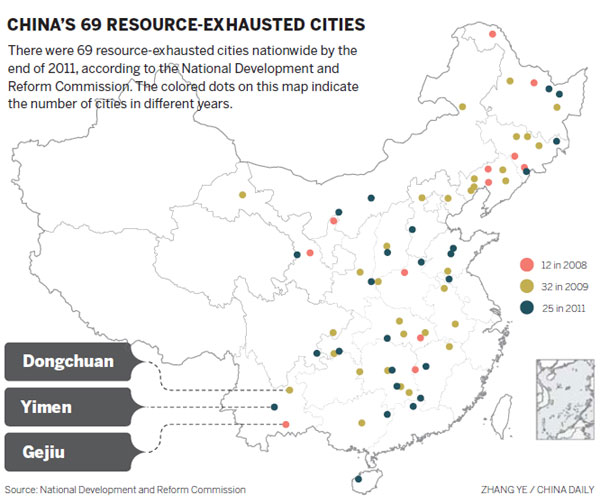Tin city explores economic shift
Solutions
About 100,000 people work in the local mining industry. Although profitable, the industry has caused numerous healthcare problems for the city authorities, said Wang Yongchang. "Occupational diseases, black lung and silicosis in particular, cost the workers a lot of money," he said, referring to the bills for medical treatments.
About 53,000 of Gejiu residents rely on basic State support. That's roughly 10 percent of the total number of claimants in Yunnan, even though the city is home to just 1 percent of the provincial population, according to Gejiu's development and reform bureau.
However, the effect of the transformation is already becoming apparent. During the past six years, the urbanization ratio has increased to 70 percent from around 40 percent. Moreover, the average per capita disposable income of Gejiu's urban residents rose to 17,915 yuan last year, more than double the amount in 2006, but still just 72 percent of the national average, the same proportion as seven years ago.
Since 2008, the central government has awarded Gejiu 780 million yuan. The money is part of a plan to accelerate the economic transformations of 69 resource-exhausted cities. The city government will receive 200 million yuan per annum until 2015 to improve its cultural and manufacturing industries.

But it's a costly business; after paying the salaries of public servants and funding infrastructure projects last year, the city government had little left from its initial budget of 2.1 billion yuan, said Wang Yongchang. In the next three years, the city will require a further 3.5 billion yuan for economic transformation.
Like many other resource-exhausted cities, Gejiu's transformation will take at least 30 to 50 years, said Wang Yongchang. "The fostering of new industries is not something that can be achieved simply by saying the word - instead, it will require patience and financing. The city has contributed its resources and paid taxes for the development of our country, and now it's time for the central government to invest more in Gejiu."





















